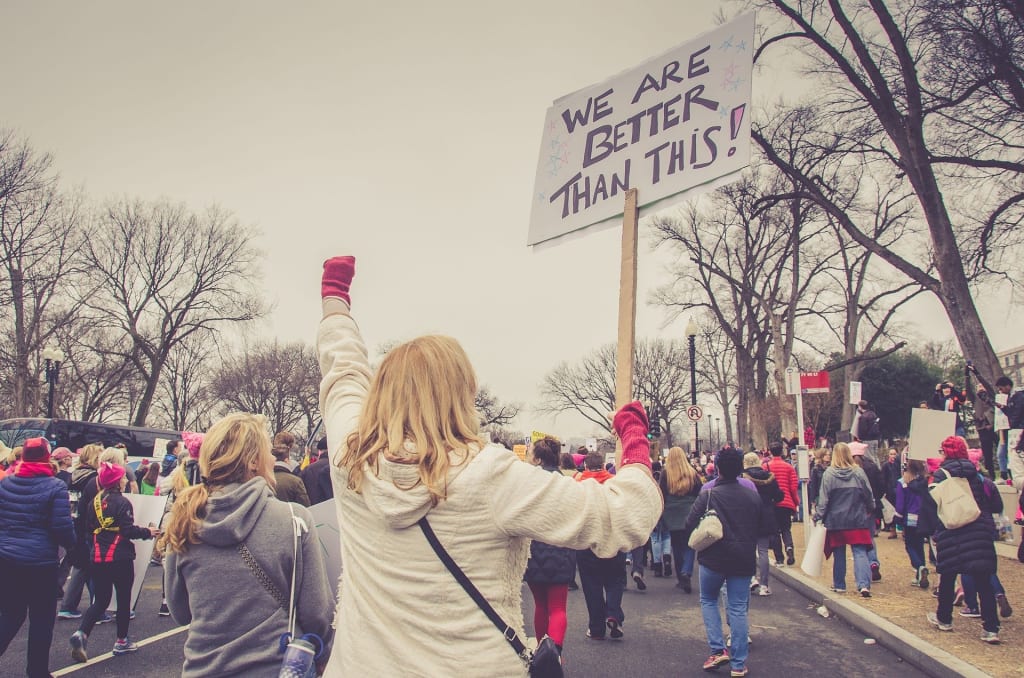Why the Worst Thing You Can Say Right Now Is, “Don’t Talk to Me if You Voted for Trump.”
It’s time to start healing

My friend Nancy held an extraordinary series of events this summer. I did not realize how extraordinary they were until I watched the recent violence at the Capitol and realized how deeply divided this country really has become.
Nancy lives in a quiet suburb in Colorado. As the pandemic hit, she and her husband were feeling increasingly isolated. She wished that she lived in a friendlier neighborhood where she actually spoke to her neighbors. So, she decided to do something about it.
An ex-piano teacher, she decided to hold garden concerts twice a month. She would send out invitations to her whole neighborhood, many of whom she had never spoken to and who had never spoken to each other. She would put out chairs in the garden, plug in some speakers, and play for anyone who showed up. Many of her neighbors did.
What was extraordinary about Nancy’s concerts isn’t her music, as exquisite as it was. It was that in the year leading up to the most polarizing election in American history, she got her fiercely Democratic and Republican neighbors to sit down together and actually enjoy talking to each other. Nancy herself was a staunch Democrat and had even disowned many Republican family members. Her husband told me that she would often say, “Never, under any circumstance will I associate with a Trump voter.”
That is until they showed up in her garden to listen to her music. Nancy did what no news channel, celebrity, or social media platform could do. She helped many of her Democratic and Republican neighbors see each other as humans. Someone’s husband, someone’s mother, someone’s friend. Their friend. In light of recent events, these regular gatherings seem like a miracle.
“These people who voted for Trump are unbelievable. I can’t understand any of them. They are idiots and abhorrent. Except for Bob and his family of, course. You know, they watered out plants for us while we were gone and we love talking about gardening. Look, he gave me this gorgeous plant,” she beamed.
Except for Bob and his family, of course.
I don’t think she saw the contradiction in her statement but that distinction is exactly what we need more of. We need more people to see the more moderate factions of either political party as human beings. We need Nancy to see more Republicans as Bobs and for Bob to see more Democrats as Nancies.
The biggest problem today is that the news and social media platforms are the primary way we develop our perceptions of the people who make up the other side. Both these mediums highlight only the most extreme actions of either party. Your elderly grandfather who voted for Trump because he thought he would get more crop subsidies or your religious grandmother who doesn’t believe in abortions doesn’t make the news because frankly, a crazy shaman makes for much better television.
The news and social media introduce two inherent biases. First, it creates this feeling that there is an “outgroup” that is very different from you — a well-studied concept known as othering. Second, it creates a feeling that everyone in the outgroup is an extremist and that they are all the same. The latter is probably the most dangerous and divisive. If you think that everyone in that group is the same and that they are all bad, there is simply no point in trying to talk to any one of them.
When you say, “Don’t talk to me if you voted for Trump,” you are cementing these biases within yourself. You are reducing people to nothing more than their political stance and you are actually creating a greater divide for this country. When you debate them on social media, you are actually creating shareable ammunition that says, “Let me show you more ways in which we are different from you. Let me label you in ways which clearly identify you as different from us.”
I came over to America as an immigrant. As an Australian, I’m not a voter. I would regularly ask people how they planned to vote, and they would tell me honestly since they presumed that I wouldn’t judge them. So, I listened to a highly educated but deeply religious doctor explain that she voted for Trump because she didn’t believe in abortions. I listened as my dark-skinned, Muslim waiter explained that he was afraid that Democrats might shut things down more and he would be homeless. Right now, that scared him more than racism. I listened as my coworker talked about how he felt Republican policies were better for farmers — of which many of his family were. Besides, they had always voted Republican. All three disliked Trump but also believed that he ultimately did not hold much power in office. Clearly, they were wrong.
The bigger question isn’t if you should be friends with them, it is — how do Republicans and Democrats unite so that they can change the country together? This requires that both sides come to the middle. You don’t have to agree on everything, you just have to agree on something. The most effective way to change someone’s mind is not by insulting them but by talking to them and getting them to connect emotionally to the “other” group. In this case — you.
In 2016, researchers set out to understand if this exact thing could be done. Would just talking to people be enough to influence deeply ingrained thinking and more importantly, change voter behavior? They sent out 56 canvassers to have a 10-minute conversation with voters in South Florida about discrimination against transgender people. The randomized trial discovered that these conversations substantially reduced discrimination against transgender people and that the change was greater than Americans’ average decline in homophobia from 1998 to 2012.
Here is the most important part — the effects persisted even 3 months later, indicating some degree of durable change. The researchers confirmed what many LGBTQ people already knew — the strongest antidote to prejudice is meeting, and especially, knowing a gay or queer person.
When someone knows you, you become less “other” and more like them and they are more likely to make different decisions. The reason saying, “Don’t talk to me if you voted for Trump” is detrimental is because there is no space for connection — and what this country needs now, more than ever, is unity.
We need to re-humanize the other side. Know that they are your neighbors, coworkers, and even family. Know that they are made up of more than the political ideology they believe in. Know that the extremists don’t represent everyone and they are not all bad people. The moderate Republicans are the people who would take your family in if your house burned down, who would pet sit for you while you are gone, and sometimes — they are the people who raised you. There are many, many, people who voted for Trump who condemn the recent violence. So, no, they are not all the same.
This is not written in defense of Trump voters — but in defense of humanity. The only way for society to heal is to close the divide and the only way you can do this is by saying, “If you are voted for Trump, I want to talk to you. I want to understand why.”






Comments
There are no comments for this story
Be the first to respond and start the conversation.